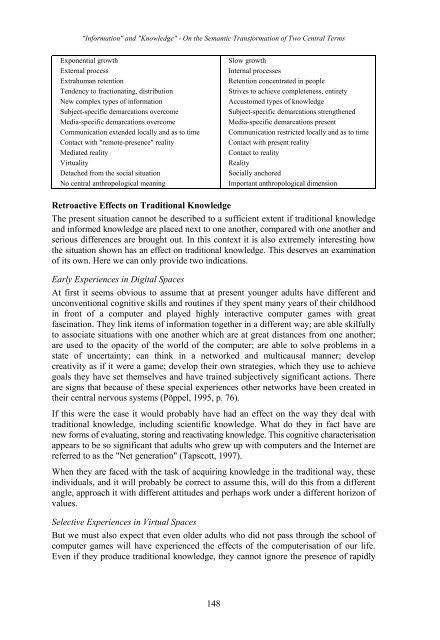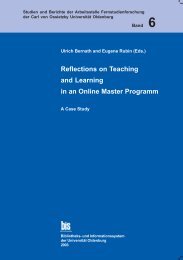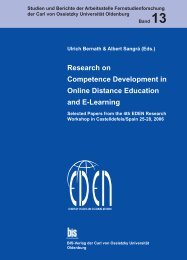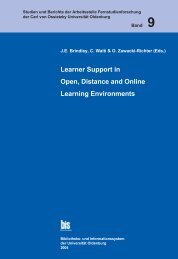Distance Education in Transition - Master of Distance Education ...
Distance Education in Transition - Master of Distance Education ...
Distance Education in Transition - Master of Distance Education ...
You also want an ePaper? Increase the reach of your titles
YUMPU automatically turns print PDFs into web optimized ePapers that Google loves.
"Information" and "Knowledge" - On the Semantic Transformation <strong>of</strong> Two Central Terms<br />
Exponential growth<br />
External process<br />
Extrahuman retention<br />
Tendency to fractionat<strong>in</strong>g, distribution<br />
New complex types <strong>of</strong> <strong>in</strong>formation<br />
Subject-specific demarcations overcome<br />
Media-specific demarcations overcome<br />
Communication extended locally and as to time<br />
Contact with "remote-presence" reality<br />
Mediated reality<br />
Virtuality<br />
Detached from the social situation<br />
No central anthropological mean<strong>in</strong>g<br />
Slow growth<br />
Internal processes<br />
Retention concentrated <strong>in</strong> people<br />
Strives to achieve completeness, entirety<br />
Accustomed types <strong>of</strong> knowledge<br />
Subject-specific demarcations strengthened<br />
Media-specific demarcations present<br />
Communication restricted locally and as to time<br />
Contact with present reality<br />
Contact to reality<br />
Reality<br />
Socially anchored<br />
Important anthropological dimension<br />
Retroactive Effects on Traditional Knowledge<br />
The present situation cannot be described to a sufficient extent if traditional knowledge<br />
and <strong>in</strong>formed knowledge are placed next to one another, compared with one another and<br />
serious differences are brought out. In this context it is also extremely <strong>in</strong>terest<strong>in</strong>g how<br />
the situation shown has an effect on traditional knowledge. This deserves an exam<strong>in</strong>ation<br />
<strong>of</strong> its own. Here we can only provide two <strong>in</strong>dications.<br />
Early Experiences <strong>in</strong> Digital Spaces<br />
At first it seems obvious to assume that at present younger adults have different and<br />
unconventional cognitive skills and rout<strong>in</strong>es if they spent many years <strong>of</strong> their childhood<br />
<strong>in</strong> front <strong>of</strong> a computer and played highly <strong>in</strong>teractive computer games with great<br />
fasc<strong>in</strong>ation. They l<strong>in</strong>k items <strong>of</strong> <strong>in</strong>formation together <strong>in</strong> a different way; are able skilfully<br />
to associate situations with one another which are at great distances from one another;<br />
are used to the opacity <strong>of</strong> the world <strong>of</strong> the computer; are able to solve problems <strong>in</strong> a<br />
state <strong>of</strong> uncerta<strong>in</strong>ty; can th<strong>in</strong>k <strong>in</strong> a networked and multicausal manner; develop<br />
creativity as if it were a game; develop their own strategies, which they use to achieve<br />
goals they have set themselves and have tra<strong>in</strong>ed subjectively significant actions. There<br />
are signs that because <strong>of</strong> these special experiences other networks have been created <strong>in</strong><br />
their central nervous systems (Pöppel, 1995, p. 76).<br />
If this were the case it would probably have had an effect on the way they deal with<br />
traditional knowledge, <strong>in</strong>clud<strong>in</strong>g scientific knowledge. What do they <strong>in</strong> fact have are<br />
new forms <strong>of</strong> evaluat<strong>in</strong>g, stor<strong>in</strong>g and reactivat<strong>in</strong>g knowledge. This cognitive characterisation<br />
appears to be so significant that adults who grew up with computers and the Internet are<br />
referred to as the "Net generation" (Tapscott, 1997).<br />
When they are faced with the task <strong>of</strong> acquir<strong>in</strong>g knowledge <strong>in</strong> the traditional way, these<br />
<strong>in</strong>dividuals, and it will probably be correct to assume this, will do this from a different<br />
angle, approach it with different attitudes and perhaps work under a different horizon <strong>of</strong><br />
values.<br />
Selective Experiences <strong>in</strong> Virtual Spaces<br />
But we must also expect that even older adults who did not pass through the school <strong>of</strong><br />
computer games will have experienced the effects <strong>of</strong> the computerisation <strong>of</strong> our life.<br />
Even if they produce traditional knowledge, they cannot ignore the presence <strong>of</strong> rapidly<br />
148





